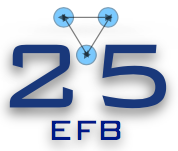Speaker
Description
Due to their large spatial extension, two-neutron halo nuclei display a significant enlargement in the low-energy $E1$ strength distribution parameterizing the Coulomb dissociation cross section. Thereby the $E1$ strength is an important observable for halo nuclei, and by comparing theoretical calculations with experimental data, we can test our understanding of these exotic nuclear systems.
In this talk, I will present results from halo effective field theory (EFT) for the $E1$ strength distribution of the two-neutron halo nucleus $^{11}$Li [M. Göbel et al., Phys. Rev. C 107, 014617 (2023)]. The distribution is obtained based on a three-body description of the $^{11}$Li ground state via Faddeev equations. Final-state interactions (FSIs) subsequent to the $E1$ breakup are taken into account using a newly developed scheme allowing for the perturbative inclusion of multiple FSIs while conserving unitarity. This method uses the Moller scattering operators.
The calculations indicate that neutron-neutron FSI is the dominant FSI. Comparison with experimental data from RIKEN [T. Nakamura et al., Phys. Rev. Lett. 96, 252502 (2006)] shows good agreement within the EFT's uncertainty bands. Moreover, we also compare our approach with theory work by Hongo and Son [M. Hongo, D. T. Son, Phys. Rev. Lett. 128, 212501 (2022)], which employed different assumptions about the $^{11}$Li halo. Finally, the $E1$ strength of $^6$He in Halo EFT will be discussed.
This work was supported by Deutsche Forschungsgemeinschaft (DFG, German Research Foundation) - Project-ID 279384907 - SFB 1245 and by the U.S. Department of Energy (Contract No. DE-FG02-93ER40756).

